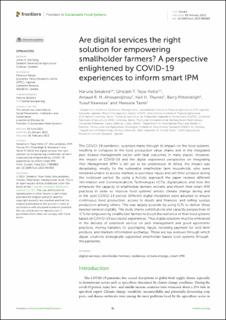| dc.contributor.author | Sekabira, Haruna | |
| dc.contributor.author | Tepa-Yotto, Ghislain Tchoromi | |
| dc.contributor.author | Ahouandjinou, Arnaud R. M. | |
| dc.contributor.author | Thunes, Karl H | |
| dc.contributor.author | Pittendrigh, Barry | |
| dc.contributor.author | Kaweesa, Yusuf | |
| dc.contributor.author | Tamò, Manuele | |
| dc.date.accessioned | 2023-09-27T13:47:10Z | |
| dc.date.available | 2023-09-27T13:47:10Z | |
| dc.date.created | 2023-05-04T13:51:53Z | |
| dc.date.issued | 2023-02-03 | |
| dc.identifier.citation | Frontiers in Sustainable Food Systems. 2023, 7 1-10. | en_US |
| dc.identifier.issn | 2571-581X | |
| dc.identifier.uri | https://hdl.handle.net/11250/3092470 | |
| dc.description.abstract | The COVID-19 pandemic, surprised many through its impact on the food systems, resulting in collapses in the food production value chains and in the integrated pest disease management sector with fatal outcomes in many places. However, the impact of COVID-19 and the digital experience perspective on Integrating Pest Management (IPM) is still yet to be understood. In Africa, the impact was devastating, mostly for the vulnerable smallholder farm households, who were rendered unable to access markets to purchase inputs and sell their produce during the lockdown period. By using a holistic approach the paper reviews different Information and Communications Technologies (ICTs), digitalization, and how this enhanced the capacity of smallholder farmers resilient, and inform their smart-IPM practices in order to improve food systems' amidst climate change during and in the post-COVID-19 period. Different digital modalities were adopted to ensure continuous food production, access to inputs and finances, and selling surplus production among others. This was largely possible by using ICTs to deliver these needed services digitally. The study shares contributions and capacity perspectives of ICTs for empowering smallholder farmers to boost the resilience of their food systems based on COVID-19 successful experiences. Thus digital solutions must be embraced in the delivery of extension service on pest management and good agronomic practices, money transfers for purchasing inputs, receiving payment for sold farm produce, and markets information exchange. These are key avenues through which digital solutions strategically supported smallholder-based food systems through the pandemic. | en_US |
| dc.language.iso | eng | en_US |
| dc.publisher | Frontiers Media | en_US |
| dc.rights | Navngivelse 4.0 Internasjonal | * |
| dc.rights.uri | http://creativecommons.org/licenses/by/4.0/deed.no | * |
| dc.title | Are digital services the right solution for empowering smallholder farmers? A perspective enlightened by COVID-19 experiences to inform smart IPM | en_US |
| dc.title.alternative | Are digital services the right solution for empowering smallholder farmers? A perspective enlightened by COVID-19 experiences to inform smart IPM | en_US |
| dc.type | Peer reviewed | en_US |
| dc.type | Journal article | en_US |
| dc.description.version | publishedVersion | en_US |
| dc.rights.holder | © Sekabira,Tepa-Yotto, Ahouandjinou, Thunes, Pittendrigh, Kaweesa and Tamò | en_US |
| dc.source.pagenumber | 1-10 | en_US |
| dc.source.volume | 7 | en_US |
| dc.source.journal | Frontiers in Sustainable Food Systems | en_US |
| dc.identifier.doi | 10.3389/fsufs.2023.983063 | |
| dc.identifier.cristin | 2145524 | |
| dc.source.articlenumber | 983063 | en_US |
| cristin.ispublished | true | |
| cristin.fulltext | original | |
| cristin.qualitycode | 1 | |

